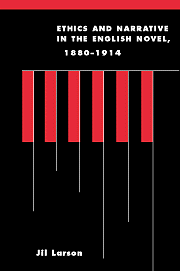Book contents
- Frontmatter
- Contents
- Acknowledgments
- 1 Ethics and the turn to narrative
- 2 Victorian history and ethics: anxiety about agency at the fin-de-siècle
- 3 Emotion, gender, and ethics in fiction by Thomas Hardy and the New Woman writers
- 4 When hope unblooms: chance and moral luck in A Laodicean, The Mayor of Casterbridge, and Tess
- 5 Oscar Wilde and Henry James: aestheticizing ethics
- 6 Promises, lies, and ethical agency in Joseph Conrad's Under Western Eyes
- Afterword
- Notes
- Bibliography
- Index
Afterword
Published online by Cambridge University Press: 22 September 2009
- Frontmatter
- Contents
- Acknowledgments
- 1 Ethics and the turn to narrative
- 2 Victorian history and ethics: anxiety about agency at the fin-de-siècle
- 3 Emotion, gender, and ethics in fiction by Thomas Hardy and the New Woman writers
- 4 When hope unblooms: chance and moral luck in A Laodicean, The Mayor of Casterbridge, and Tess
- 5 Oscar Wilde and Henry James: aestheticizing ethics
- 6 Promises, lies, and ethical agency in Joseph Conrad's Under Western Eyes
- Afterword
- Notes
- Bibliography
- Index
Summary
English fin-de-siècle novels, as I have endeavored to show, are among the most ethically challenging narratives of the Victorian period because they were written in a time of cultural transition and anxiety about ethical agency. In periods of greater cultural stability, the sort of moral perplexity so evident in these texts vanishes under a veneer of self-assurance. But the sheer insecurity of the ethical perspectives of turn-of-the-century narratives, because it disables the capacity to gloss over all that does not fit a neat set of norms, makes possible an honesty about the difficulty, the loose-ends, and the unresolvable problems of our moral lives.
In the New Woman writing, fiction by both men and women challenged separate spheres ideology through its formal experimentation and its exploration of the capacity of emotion to liberate moral thinking from gendered rules and norms. Reading this literature in the context of philosophical ideas about emotion, reason, and gender enables a richer understanding of the importance of feelings in the lives of late-century intellectual women struggling with ethical problems. These feelings reveal a cognitive dimension when studied in relation to ethical choice, and thus the novelists redeem emotion from the questionable status that Victorian culture had conferred upon it by associating it with women. As I argue, however, while Schreiner, Grand, and Hardy reconceptualize the traditional Victorian heroine, they also vividly represent all that militates against this woman's new sense of self – her social ostracism, her guilt, her failure in romantic relationships.
- Type
- Chapter
- Information
- Ethics and Narrative in the English Novel, 1880–1914 , pp. 137 - 140Publisher: Cambridge University PressPrint publication year: 2001



